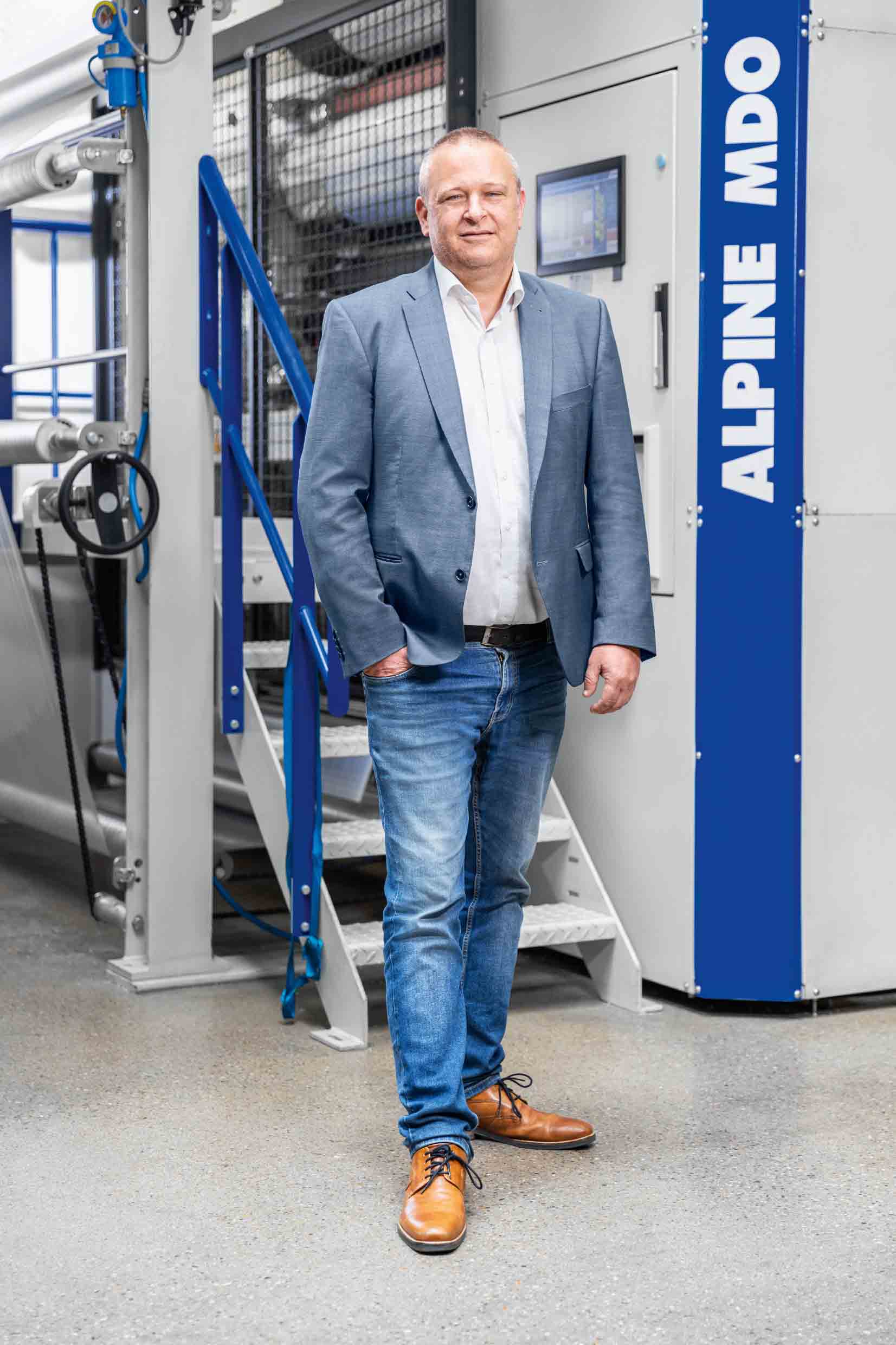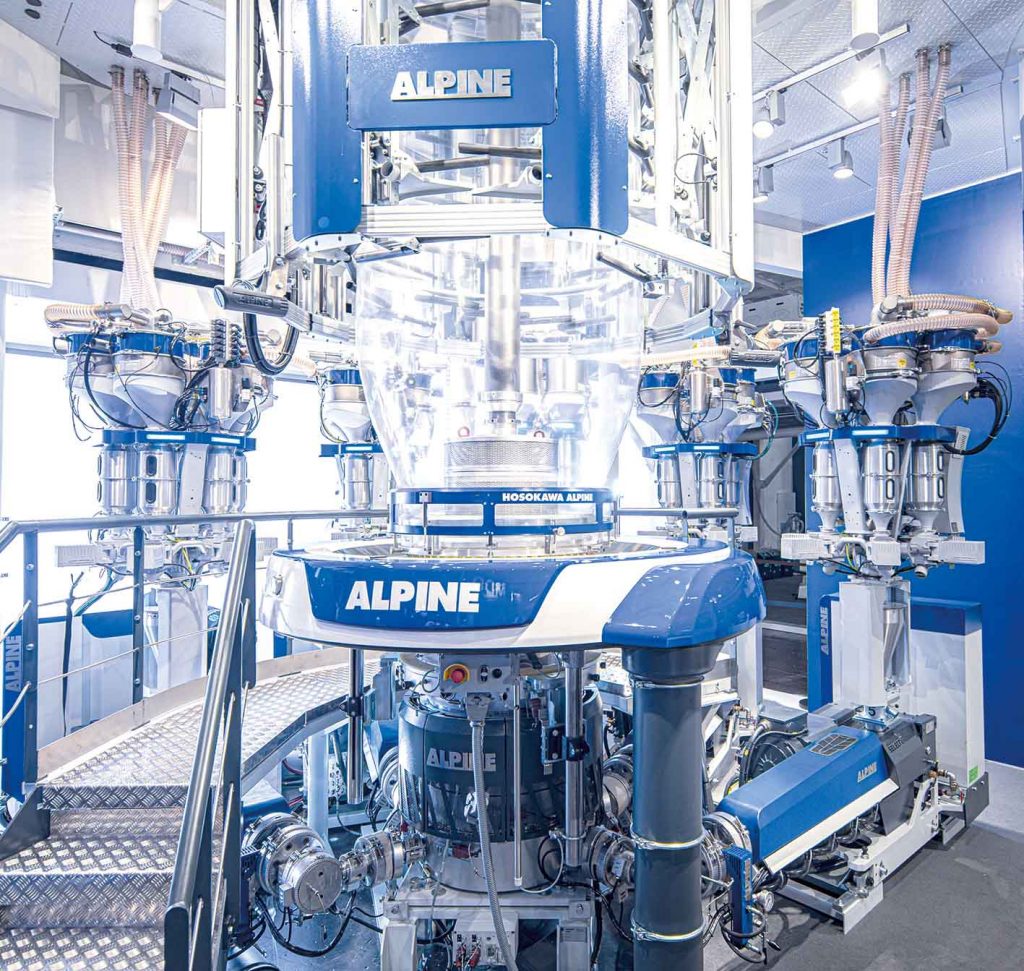
“The use of recycled material is increasingly requested by customers worldwide”
Mr. Oberbauer, what contribution does your company make to the circular economy?
We are the pioneer of MDO technology in the blown film world. It is based on mono-axial film stretching and enables the improvement of properties of the end product. By further developing MDO technology, we have succeeded in taking a significant step towards the production of sustainable packaging from blown film. This further development has made so-called full-PE solutions or monomaterial solutions a possibility, so that this technology makes a significant contribution to the recyclability of plastics.

How does it work?
Full PE solutions are the hot topic in the blown film sector today. Ideally, these films consist of only one raw material, namely polyethylene. With the help of our MDO technology, the blown film world can produce packaging that can replace materials such as PET, for example. A normal stand-up pouch, of which you see thousands throughout supermarkets everywhere, is typically made of different plastics, such as PET laminated against an inner layer of PE blown film for instance. Composites of that nature are not recyclable. You can shred those PET and polyethylene composites, but you can no longer use them in similar applications. By using MDO technology, for example, the PET can be replaced by polyethylene. The blown film is stretched again, which allows it to be altered mechanically and optically. This bestows the PE film with improved properties that were previously covered by the PET film, for example. This allows a product to be made solely from polyethylene. Such a monomaterial product can be recycled and used again to produce film.
Is the demand for those types of solutions increasing?
This MDO technology, which enables a full PE solution as an addition to the blown film plant, is increasingly coming onto the market. It is becoming more and more important in the circular economy. Meanwhile, we are involved in multiple projects applying MDO technology. We are now reaping the benefits of working on and perfecting this technology for a long time, even before the circular economy was the topic of discussion. The potential is huge, but ultimately, everything is dependent on political factors, social pressure and the availability of suitable material. We can’t change the world on our own. We can only offer mechanical engineering products that are capable of doing all this. We see it as our duty to make this possible.
Where do you see challenges in the use of recyclates on the mechanical engineering side?
The integration of recyclates into new products is a major challenge if, at the end of the process, you want the same high-quality new products. The purity of the granulate is crucial; any impurity in this granulate is a potential problem, especially with the thin films of 20 to 30 micrometers that we produce with our systems. The quality of the recyclate is not always given. Often, even as a buyer, as a film manufacturer, you don’t know exactly what you’re getting. If we as machine manufacturers know that a customer uses recyclates, then we’ll design our machines accordingly. If the input material is not pure, then these are all possible disruptions to production, for the mechanical properties and the quality of the product. However, our components are optimally matched to each other, and we can design them to cope very well with these material fluctuations.
How great is the international interest in the use of recyclates?
There is an upward trend worldwide, but there are still major regional differences. Europe is already quite far advanced, while Asia is still lagging behind. However, in discussions with customers around the world, we see that the use of recycled materials is being increasingly requested. The Indian market for example is certainly still less developed in this respect, but there the goal is to achieve a 7 percent annual growth in the recycling market by 2030. The APAC region also has ambitious goals though, namely to become the leading market in the use of recyclates by 2025. I think the world is heading in the right direction.
The circular economy is still maturing. What needs to happen for plastic to be recycled in large quantities?
The idea may be fairly new, but it is remarkable how many developments and also applications there are now. In the meantime, stand-up pouches are already being produced that consist of 80 percent recyclate. Simple carrier bags already use up to 100 percent recyclate, so everything is moving in the right direction. At present, only a small proportion of plastic waste flows into the circular economy. For this to increase, many aspects need to be tightened: collection systems must be introduced or improved, raw material manufacturers must continue to develop appropriate materials, products must be designed so that they can ideally be made from one class of plastic, and machine manufacturers must build and prepare machines so that they can process recyclates well. Major brands need to define specifications regarding the design and recyclability of their packaging. Society and the end consumer must be won over to the cause. We are already working very closely with partners from the entire value chain. Many are involved, but the main driver must be politics. Without political pressure, without guidelines, and without political incentives, it simply won’t work.
Industry interviews on the road to the K:
The world is facing major challenges: Climate change must be fought; the environment must be protected, and resources must be conserved. It is also important to make good use of the opportunities offered by digitalisation. The plastics industry has a key role in this process because plastics are ubiquitous in the world.
Climate protection, digitalisation and the circular economy are therefore also the three major topics at K 2022, the world’s leading trade fair for the plastics industry. To get in the mood for the industry meeting in autumn 2022, the VDMA is letting representatives of the plastics machinery industry and all other stakeholders in the sector have their say through weekly interviews.
VDMA Plastics and Rubber Machinery
More than 200 companies are members of the trade association, covering over 90 percent of the industry’s production in Germany. Ten percent of our member companies come from Austria, Switzerland and France. German member companies represent a turnover of 7 billion euros in core machinery and 10 billion euros including peripheral technology. Every fourth plastics machine manufactured worldwide comes from Germany in terms of value; the export quota is 70 percent. Ulrich Reifenhäuser, managing partner of Reifenhäuser GmbH & Co KG, is the chairman of the trade association.